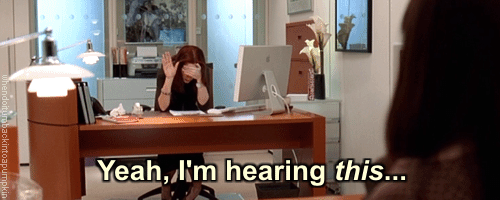Most of us associate writing with perfect grammar, a minimum word count and strict formatting, but that high school writing regimen produced writing habits that now haunt us. Remember when the five-paragraph essay was all the rage in English class?
Unfortunately, the patterns we learn in school don’t necessarily translate into the real world and having a record of flawless research papers doesn’t always mean you’ll be fit for a magazine. After years of lengthy assignments, magazine journalism can seem like an entirely different universe. Kick these five habits to the curb before you go knocking on Cosmopolitan’s door.
1. Wordiness

As a magazine journalist, be prepared to hear the word “concise” at least 50 times a day. Trying to reach a minimum word count left us with a horrid habit of making sentences a mile long. Magazines are your quick stop for information: the shorter, the better. Getting straight to the point keeps the reader hooked and makes things simple to understand.
Don’t: Most four year universities have a resourceful career center that will only take a few minutes of your time to find the best jobs and internships your area has to offer for the fall.
Do: Career centers are your one stop shop for impressive job and internship opportunities.
2. Repetitive sentence structure

One way to have your reader yawning is by clinging to one sentence structure. Keep them on their toes and use short, long, cause and effect and maybe a few lists here and there. If you’re not reading a poem, hearing the same beat again is both unnecessary and dull. Poets, do your thing. Journalists, try to spice things up a bit.
Don’t: Go find a summer job. It’ll make the time go by faster. You’ll make some money in the process.
Do: Landing that summer job will make the scorching days fly by, while helping you save a few bucks for fall. New game day outfits anyone?
3. Passive Voice
Improper grammar used to be the number one felony in writing, but being bold and clear proves just as valuable as passing spellcheck. Passive voice drains the clarity from your writing until it’s a murky mess. Once your reader becomes lost in your writing, you’ll never get them back.
Don’t: The school was a perfect fit for me and the campus was amazing.
Do: I could immediately picture my life as a Seminole as I walked through the campus enthralled by the spirited atmosphere.
4. Formality

Reading an article that sounds like someone is talking to their boss is a total turn off. Your writing pieces should be conversational, so keep the discussion as casual as possible. Throwing in some slang or pop culture references connects you to your reader. No need to write stiff as a board like you did in your History of the American Revolution paper. Shakespeare had it right when he perked things up with some comic relief.
Don’t: Failing that test required me to really reevaluate my priorities and how I was spending my time. I suddenly realized I was not very dedicated to my studies.
Do: Bombing that Spanish midterm made a future of moving back home to flip burgers flash through my mind. Maybe all those weekends sipping mojitos by the pool could’ve been spent in the library.
5. Repetition

Remember reading your essays and realizing you used the word “interesting” about a hundred times? Redundancy may slide in school, but magazines want nothing to do with it. Using the same adjective repeatedly showcases laziness and lack of creativity. Becoming a walking thesaurus will make your writing enthralling, engrossing and compelling. You may have to rewrite your sentences a few times, but you’ll always find a catchier way to make a point.
Don’t: These surprising beauty hacks were a life saver. I was so surprised you could use apple cider vinegar for so many things; it was so surprising.
Do: Who knew apple cider vinegar could abolish blemishes and soothe my post-Memorial Day sunburn? Goodbye Clean and Clear, hello magic ACV.



















